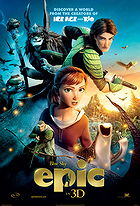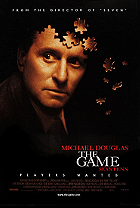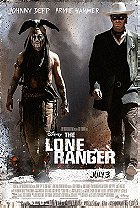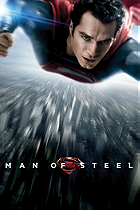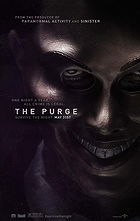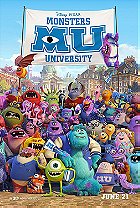Pacific Rim is of a rare breed of summertime blockbuster: it's not a reboot, a remake, a sequel, or a comic book adaptation. Instead, it's an original property, with Mexican director Guillermo del Toro dreaming up a new big-screen universe that pays tribute to the old Kaiju and mecha movies associated with Japan. Del Toro's first feature in five years, Pacific Rim is an uncomplicated actioner pitting monsters against an array of giant robots, yet it's more proficient than Battleship or Transformers thanks to the deft filmmaking on display. Del Toro understands how to nail the sense of childlike awe necessary for this type of blockbuster, rendering Pacific Rim an exhilarating summer treat. Nevertheless, despite the slick visuals, the picture suffers due to slipshod scripting, ultimately kneecapping what should have been an easy home run.

In the future, massive alien monsters known as Kaijus emerge from an underwater portal located at the bottom of the Pacific Ocean, rising to wreak havoc in densely populated cities. In response, the world's governments collaborate to construct enormous artificial robots known as Jaegers to engage the beasts in combat. Jaegers require two pilots, with the pair engaging in "drifting" - that is, locking minds - to operate the robots in sync. A retired Jaeger pilot who lost his brother in a Kaiju battle, Raleigh (Charlie Hunnam) is called back to duty by his former commanding officer, Stacker (Idris Elba), who needs all the pilots he can find for humanity's final stand against the Kaijus. In need of a co-pilot, Raleigh finds a comrade in young Mako (Rinko Kikuchi), who has traumatic memories of the monsters from her childhood. Also investigating the Kaiju threat is scientist Dr. Newton (Charlie Day), who finds himself able to "drift" with a Kaiju brain, in the process uncovering potentially vital evidence for the survival of humankind.
An exuberant piece of entertainment designed for maximum theatre wall shaking, Pacific Rim is vast in scale to match the depth of del Toro's imagination. But while the film carries the strengths of Hollywood's best blockbusters in terms of eye candy, the screenplay by del Toro and Travis Beacham, unfortunately, falls victim to several eye-rolling Hollywood chestnuts. The death of Raleigh's brother is a clichéd device, and things only grow worse from there. For instance, none of the new hotshots believe Raleigh or Mako have any merit as Jaeger pilots, yet the pair are forced to enter a fight and wind up coming out on top, winning everyone's respect in the process. If that isn't conventional enough, the climax comes packaged with the trademark sacrifice and the faux character death. Practically every story beat is from the Big Book of Action Clichés. On top of all this malarkey, the scientists are hackneyed caricatures that never feel like real people. Plus, the dialogue lacks the spark that such writers as Shane Black and Joss Whedon can impart, leading to patches of uneven pacing. Del Toro ultimately keeps the picture afloat thanks to smooth mise-en-scène, but smarter scripting would not be an unreasonable request considering the usual quality of the director's output.

Fortunately, the rest of Pacific Rim is a home run, with first-rate technical specs across the board. Whenever del Toro is locked in action mode, some of 2013's best blockbuster moments emerge, as the filmmaker understands how to create honest-to-goodness excitement. Whereas Michael Bay makes it his duty to ensure that it's impossible to discern what the hell is happening at any certain time in Transformers, del Toro captures everything in sturdy wide shots here, letting us watch the carefully designed CGI battles benefitting from novel choreography. As with Man of Steel, some viewers will no doubt be unnerved by the surplus of destruction, but it's hard to imagine a situation like this playing out in reality that wouldn't result in the devastation of major cities. In terms of action, the only drawback is the lack of daylight skirmishes; apart from one all-too-brief daytime throwdown in Sydney, the battles occur in dark, dimly-lit settings. Still, this is not a significant drawback, as the action scenes here are consistently exhilarating nonetheless. You would have to be the biggest cynic on the planet not to harness your inner child and marvel at the superb set pieces.
As expected, the digital effects are marvellous, giving vivid life to the Godzilla-like monsters and the tremendous Jaegers. Del Toro is a kid in a candy store here, efficiently using the $180 million budget to visualise the grand-scale action. While the behemoths in Bay's Transformers are impossibly smooth, Pacific Rim presents a more plausible spin on giant robots - the Jaegers here have real weight and inertia, and suffer a continuous stream of damage. Every part of the Jaegers seems to have a purpose, as opposed to the Transformers designs which are ugly and busy. Del Toro thankfully infuses Pacific Rim with a healthy sense of humour, too, finding Jaegers using ships and metal containers as makeshift weapons while the destruction of an office building sets off a steel ball pendulum.

There's not much to write home about in terms of acting. Hunnam has the right physique to be an action hero, but his screen presence is too underwhelming, rendering him a bland protagonist when Pacific Rim needed a strong anchor. Mildly more successful is Idris Elba, who's authoritative and badass here. The rest of the acting is merely adequate - as with the narrative, del Toro paints the characters in broad strokes of primary colours for marketing needs, though he does introduce a good demonstration of his typical idiosyncrasies in the form of Ron Perlman as Hannibal Chau, a black market trader of monster remnants. Perlman continually enlivens the picture and scores a few laughs, but he feels like a missed opportunity since he's far too underused.
Is Pacific Rim the large-scale monsters vs. robots masterpiece we all hoped for? Not exactly, as the film is hollow and could've used a stronger screenplay. While it is aided by a few instances of trademark del Toro quirks, it's not as funny or as heartfelt as his best efforts, plus the chatter is often lifeless, and the narrative is a mishmash of blockbuster clichés. That's not to say Pacific Rim has no merit, though. On the contrary, it's a wonderfully entertaining, at times awe-inspiring instance of A-grade eye candy from a passionate filmmaker. It's definitely worth seeing on the biggest screen possible.
6.8/10
 Login
Login
 Home
Home 183 Lists
183 Lists 1671 Reviews
1671 Reviews Collections
Collections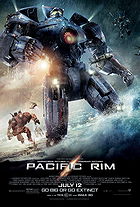
 0 comments,
0 comments, 